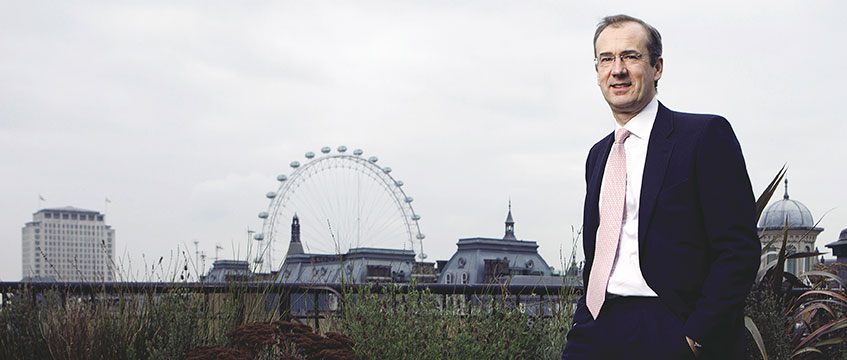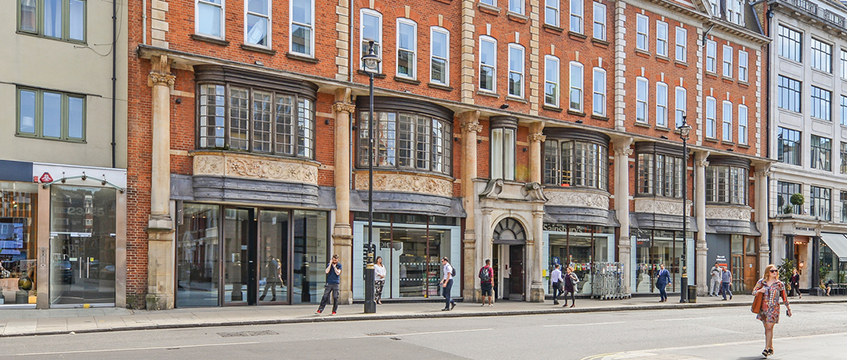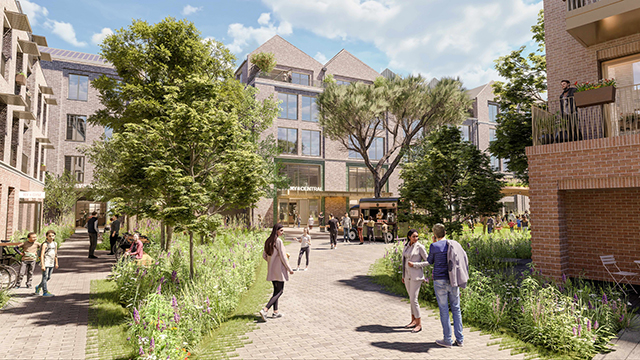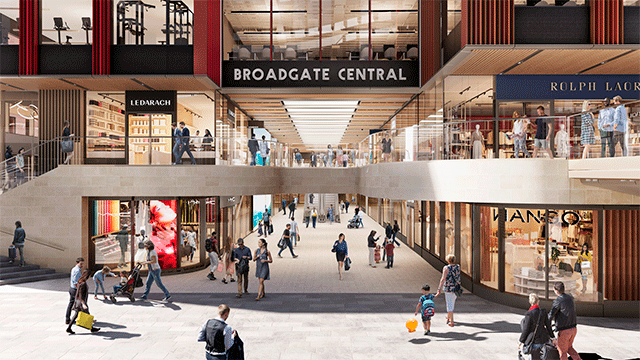Land Securities continued its policy of net sales as its portfolio valuation dropped 1% and it underperformed the IPD benchmark in its annual results for the year to March.
“Put simply, our markets remain in good health but they have paused for breath,” chief executive Rob Noel said in his statement for the year to the end of March 2017.
The value of its £14.4bn portfolio declined by £147m, or 1%, during the year, compared with a £907m increase the year before. The portfolio’s total return was 3.7% during the year, against the IPD average of 4.6%.
Revenue profit for the year was up 5.5% to £382m, from £362m the year before.
During the year LandSec made a further £413m of disposals, and spent just £15m on acquisitions, though development and refurbishment expenditure was £286m.
Noel said: “We have achieved our plan to have minimal development exposure and longer lease terms in London offices, a transformed retail portfolio and low gearing at this point.”
Financial results
| March 2017 | March 2016 | |
|---|---|---|
| Revenue profit | £382m | £362m |
| Valuation (deficit)/surplus | £(147)m | £907m |
| Profit before tax | £112m | £1,336m |
| Basic earnings per share | 14.3p | 169.4p |
| Combined portfolio | £14.4bn | £14.5bn |
| Adjusted net debt | £3.3bn | £3.2bn |
| Group LTV ratio | 22.2% | 22.0% |
The REIT maintained a cautious outlook for the year ahead and the longer-term effects of the UK’s decision to leave the European Union.
Noel said: “Over the next 12 months, we are unlikely to see rental values grow in London unless we have more certainty on movement of people and the UK’s terms of trade with the EU and the rest of the world. In the retail sector, the extent to which higher supply chain costs are passed on to customers remains to be seen. Whatever the outcome, higher costs tend to reduce take-up of space.”
Gross rental income in the portfolio declined by £11m from £648m to £637m. Net rental income declined from £604m to £600m.
“In the short term, with significantly reduced risk and a portfolio of first-class assets, we go forward in excellent shape, ready to make acquisitions when the time is right,” Noel said.
The REIT has refinanced £690m of bonds and extended the term of its debt with a further £700m bond issues during the year, and LTV remains virtually unchanged at 22.2%.
While LandSec has remained a net seller over the year, other schemes coming online increase voids in the portfolio to 4.6% from 2.4% the year before. Its Nova office development in Victoria completed during the year and is 54% let with a further 283,000 sq ft available. The Westgate Centre in Oxford is set to open in October and is 80% prelet.
Portfolio values
| Market value | Value shift | Rental value change | Net initial yield | Equivalent yield | Change | |
| £m | % | % | % | % | bps | |
| Shopping centres and shops | 3,663 | -1.3 | 1.6 | 4.3 | 4.8 | 9 |
| Retail parks | 855 | -4.2 | 0.6 | 5.5 | 5.6 | 24 |
| Leisure and hotels | 1,361 | 2.3 | 0.2 | 5.2 | 5.4 | -6 |
| London offices | 4,153 | -4.4 | 2.5 | 4 | 4.7 | 18 |
| Central London shops | 1,267 | 6.9 | 4.7 | 2.5 | 4.1 | 7 |
| Other (retail and London) | 61 | -6 | 3.4 | 1.9 | 3.6 | 2 |
| Total like-for-like portfolio | 11,360 | -1.4 | 1.9 | 4.2 | 4.8 | 11 |
| Proposed developments | 6 | -33.2 | n/a | – | n/a | n/a |
| Development programme | 1,138 | 1.3 | n/a | 0.1 | 4.2 | n/a |
| Completed developments | 1,841 | -0.4 | 1.9 | 2 | 4.2 | 10 |
| Acquisitions | 94 | 0.4 | n/a | 3.7 | 3.8 | n/a |
| Total combined portfolio | 14,439 | -1 | 1.9 | 3.6 | 4.7 | 9 |
Comment: Difficult to get excited
Land Securities’ final figures look pretty uninspiring, in truth, writes Alan Carter of Stifel.
There was nothing amiss with the outturn, although the NAV was 1% below our expectation at 1417p (down 1.2% year-on-year, up 0.6% on H2) and the dividend was hiked, as expected, by a healthy 10%.
The business is described by management as “rock solid”, with long leases and low leverage, and the cost of debt has been further reduced. However, the London office portfolio underperformed the IPD benchmark and the retail assets outperformed; overall, the ungeared property return was 3.7% – 90bps below benchmark. That’s not great. Letting progress on the vacant London office space is slow, but the limited retail development activity is doing ok.
The high-profile “call” that management has been making about collapsing London office rents and values (an oft-quoted drop of 25%) appears to have been softened, with the causal trends “happening, though less than we expected”. The market is described overall as pausing for breath and the business is positioned for this eventuality, which is fine, but obviously it means little growth in either capital or rental values, and more likely a softening of both.
This means any positivity has to come from revenue growth or equity creation through development activity, neither of which is likely. Like-for-like net rental income rose by £10m last year, on a rent roll of over £600m, before the impact of disposals took the headline number down by £4m. The London office portfolio has income growth from reversions/rent reviews capturing uplifts from five years ago, during which time rental values have risen strongly. Reviews conducted last year resulted in uplifts of 26% on a small(ish) multi-let City office, 3% on the office space in One New Change, EC4, and 14% at Cardinal Place, SW1. But remember: those uplifts are over five years, so it’s not exactly eye-popping.
As for development activity, there is some limited scope (which is where management wants the business positioned), most obviously at Moorfields Highwalk, EC2, where reports of a prelet to Deutsche Bank of over 500,000 sq ft have not been confirmed in the statement. I very much doubt will be alluded to at all at the results meeting, although I suspect the deal will happen eventually. A mission statement for the current year is to “grow the development pipeline through acquisitions”, which is interesting, given the degree of stress in the London office market now appears less than management was anticipating.
Overall, it is extremely difficult to get excited about the UK large caps at the moment – with the exception of SEGRO – simply because there is no real growth. The market pausing for breath could last a long time, and if that does change it’s more likely to go down than up.
Like so many in the sector, LandSec has used the bull market to create a lot of value, reposition their portfolios and reduce leverage and risk, and now they’re hunkering down. It’s what happens in real estate, but investors have become addicted to record rents and record yields. Now that has ended, share prices seem to be in a vacuum.
LandSec is in good shape, it’s just not going anywhere in a hurry – nor, I suspect, is the share price.
To send feedback, e-mail alex.peace@egi.co.uk or tweet @egalexpeace or @estatesgazette











